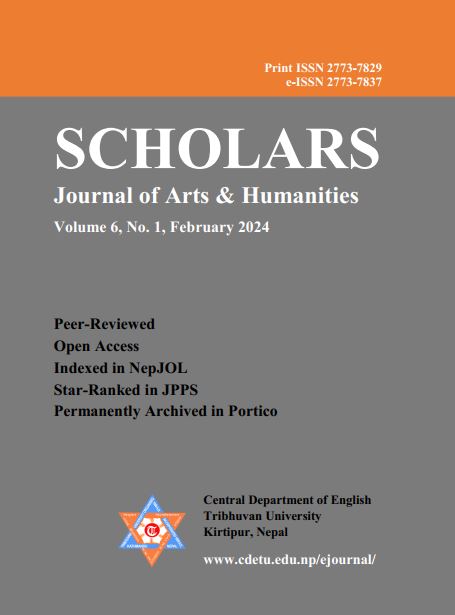Redefining the Nation and Exploring the Self: Reading Contemporary Kirant Poetry
DOI:
https://doi.org/10.3126/sjah.v6i1.62720Keywords:
Kirant poetry, nation, nationalism, identities, indigenous people, ethnicityAbstract
This paper critically analyzes how the poets belonging to the indigenous Kirant ethnic background perceive and interrogate the narratives of Nepali national identities and nationalism in their creative expressions. Six different poets belonging to Rai and Limbu communities––Shrawan Mukarung, Bhupal Rai, Upendra Subba, Swapnil Smriti, Chandrabir Tumbapo, and Heman Yatri–– are purposefully selected for this study who embrace the Kirant as their common identity. Most of the poems selected here are composed against the backdrop of People's Movement II in 2006 and reflect the marginalized ethnic perspectives about nation, nationalism, cultural identity, and indigenous consciousness. The theoretical notion of nationalism is employed in the study, drawing upon theorists like Ernest Renan, Ernest Gellnar, and David Steven. A critical analysis of the selected body of poetry offers the findings that the contemporary Kirant poets attempt to redraw the discourse of Nepali nationalism in two different ways: 1) by exposing the gaps and fissures inherent in the national narratives; and 2) by exploring and incorporating their unique selves in their compositions–– in the forms of local myths, folklore, ritualistic elements, indigenous symbols, socio-cultural values, and ethnic concerns. The study concludes that literature helps redress the crises created by the state in the past, and contemporary Nepali poetry, particularly those composed by the Kirant ethnic community, is a response that voices sentiments of the margin.
Downloads
Downloads
Published
How to Cite
Issue
Section
License

This work is licensed under a Creative Commons Attribution 4.0 International License.
© Central Department of English, Tribhuvan University and Authors




